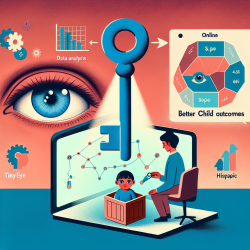Introduction
In the evolving field of speech-language pathology, data-driven decision-making is becoming increasingly crucial. For practitioners working with children, leveraging data not only enhances therapy outcomes but also fosters a more personalized and effective approach. This blog will explore how findings from the research titled "Driving a decade of change: HIV/AIDS, patents and access to medicines for all" can be applied to improve child outcomes in speech therapy.
Data-Driven Decisions in Speech Therapy
Data-driven decisions involve using quantitative data to guide clinical practices. In speech therapy, this means utilizing assessment data, progress monitoring, and evidence-based practices to tailor interventions to each child's unique needs. The research on HIV/AIDS and access to medicines illustrates the power of data in driving change and improving outcomes. Similarly, speech therapists can harness data to make informed decisions that enhance therapy effectiveness.
Implementing Research Outcomes
The research highlights the importance of reducing barriers to access and utilizing innovative approaches to improve outcomes. For speech therapists, this translates to:
- Utilizing Evidence-Based Practices: Just as the research advocates for the use of generic medicines to improve access, speech therapists should rely on evidence-based interventions that are proven to be effective.
- Personalizing Therapy: Data allows therapists to tailor interventions to each child's specific needs, much like how personalized medicine is tailored to individual patients in the research study.
- Continuous Monitoring: Regular data collection and analysis help therapists track progress and make necessary adjustments, ensuring that therapy remains effective and aligned with each child's development.
Encouraging Further Research
While the research provides valuable insights, it also underscores the need for continuous exploration and adaptation. Speech therapists are encouraged to engage in ongoing research to identify new strategies and interventions that can further improve child outcomes. Collaboration with researchers and participation in professional development opportunities can enhance a therapist's ability to implement cutting-edge practices.
Conclusion
By embracing data-driven decisions and learning from research across disciplines, speech therapists can significantly improve outcomes for children. The principles outlined in the HIV/AIDS research can be adapted to speech therapy, emphasizing the importance of access, innovation, and evidence-based practices. To read the original research paper, please follow this link: Driving a decade of change: HIV/AIDS, patents and access to medicines for all.










